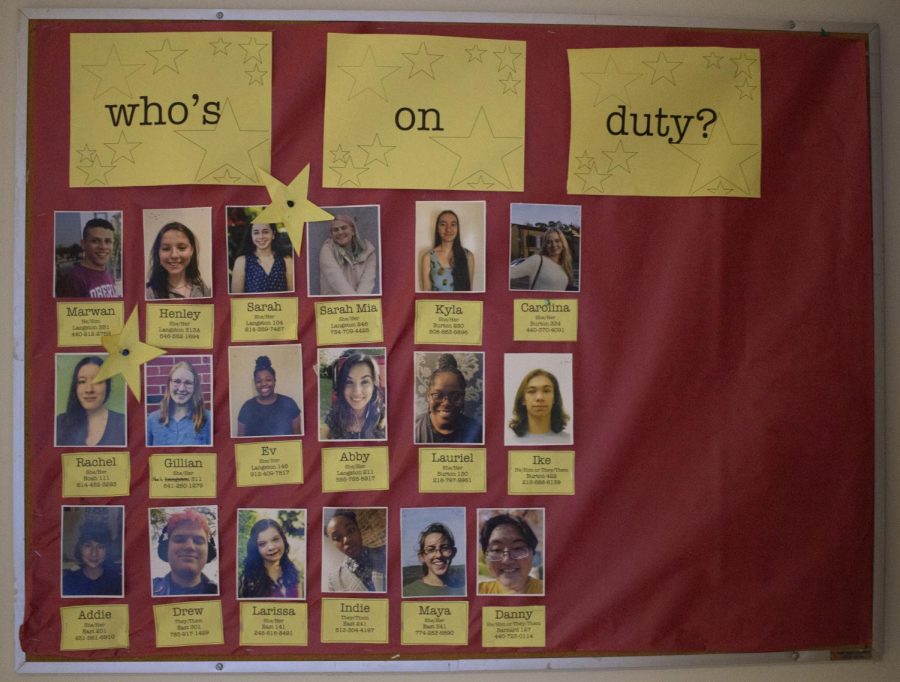RAs Request Hazard Pay For COVID-19 Responsibilities
Resident Assistants say that new ObieSafe restrictions have created extra responsibility for their jobs this year.
Some Resident Assistants are pushing for hazard pay to compensate for an increased risk of viral exposure as they help enforce COVID-19 safety guidelines. However, according to Vice President and Dean of Students Meredith Raimondo, the U.S. Department of Labor’s definition of hazard pay does not apply to RAs’ roles.
RAs at several colleges and universities, including the University of Iowa, the University of Michigan, the University of Vermont, and the University of Pennsylvania, have demanded hazard pay, arguing that the responsibilities that RAs have in a typical year have shifted in the context of a global pandemic.
According to College second-year and Theme Cluster RA Gillian Ferguson, three RAs are working with Student Senate to advocate for RAs to receive hazard pay.
“I’m not a public health professional,” said College fourth-year and Burton Hall RA Carolina Johnson. “Being RAs, you don’t want to come off as if you think you’re on some type of moral high ground. I’ve noticed that some RAs felt like it was placed on their shoulders: ‘Stopping outbreaks is up to you.’”
Vice President and Dean of Students Meredith Raimondo acknowledges that RAs have had to adapt this year, but she believes the role does not create an inappropriate level of risk for students.
“RA roles remain aligned to the position description,” Raimondo wrote in an email to the Review. “All operations are affected by COVID-19 this year, so the way RA duties are executed have changed in some instances (to ensure physical distancing, for example).”
Still, some RAs feel that the college is putting them at an unnecessary level of risk.
“I do not think RAs are given adequate protections from the virus,” College fourth-year and First Year Residential Experience RA Sun Moon wrote in an email to the Review. “I do not think RAs should be put in the position of doing rounds, especially during an airborne pandemic. I believe that an alternative system of rounds would be possible, with RAs just doing rounds in their building to minimize potential exposure to the virus, albeit this does come with other concerns.”
Other RAs like Johnson find themselves redefining their roles this semester amid requirements that they enforce ObieSafe policies.
“The role is very unclear,” Johnson said. “Does anyone understand it? I had to make my own interpretation. Just morally, what can I do? What do I feel comfortable doing as a person? And then you’ll notice other RAs taking it very differently.”
Ferguson explained that this semester, training looked different than it had in previous years.
“This year, RAs had intensive training during our first week on campus,” Ferguson wrote in an email to the Review. “We received a COVID-specific training mid-semester, though by then we already had a general idea of the expectations.”
Like Johnson, Ferguson also emphasized that day-to-day operations within the role look different, as well.
“During rounds, I wear a mask with [two or more] layers of fabric or filters, a glove, and I wash my hands thoroughly after I’m done,” Ferguson wrote. “In general, I try to stand far apart from the residents I give reminders to.”
Prior to COVID-19, duty rounds involved RAs surveying facilities and checking in on student well-being. Now, rounds entail ensuring that students are following ObieSafe policies to protect from COVID-19.
“All of these jobs are made harder being in COVID-19, especially because there are a lot more policy violations that we might experience — and these can affect our personal safety and health as well,” College second-year and FYRE RA Nihal Dayal Kodavarti wrote in an email to the Review. “For example, in the past, seeing a group of people drinking in the common room was a violation, but not something that could impact our own safety; now, it’s both a violation as well as harmful to the general community.”
Raimondo maintains that it is not the College’s responsibility to provide hazard pay to RAs, who are a very specific type of College worker.
“I would not myself use the term ‘hazard pay’ in relation to RAs, who receive a stipend to support the opportunity to participate in this educational experience,” Raimondo wrote. “I would refer you to the U.S. Department of Labor definition of hazard pay, which does not apply to RA roles. College protocols appropriately mitigate the risk of COVID-19 transmission for all students, including RAs.”
Hazard pay applies to all individuals considered “employees” under the Fair Labor Standards Act. The FLSA includes this clause on RAs: “Students serving as residence hall assistants or dormitory counselors, who are participants in a bona fide educational program, and who receive remuneration in the form of reduced room or board charges, free use of telephones, tuition credits, and the like, are not employees under the Act.”
RAs at Oberlin do receive reduced room charges as well as a stipend dispensed by paycheck, but they are not reimbursed by tuition credits.
“I want people to know that RAs generally really enjoy what they do,” Johnson said. “They enjoy building connection, and I think if we got to choose, that would be our main thing that we’re doing on campus — but we do have a list of things that we have to do.”
RAs recently submitted a proposal to the College administration to increase their compensation in response to COVID-19, but negotiations are ongoing. In the meantime, they encourage students to be mindful of the way their actions can impact RAs.







